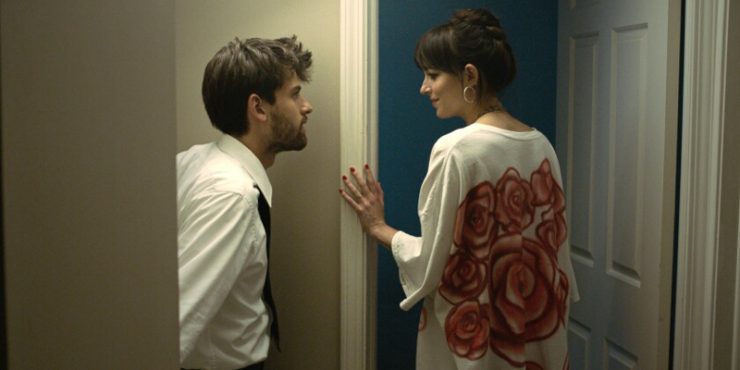We are still feeling the ripple effects of mumblecore, an American indie film movement that really spearheaded a particular kind of cinematic mediocrity that somehow passed for art. I don’t mean to say that there are no good mumblecore movies (Drinking Buddies, Funny Ha Ha), but to say that they really foregrounded a lack of charm and style, while passing it off as substantial. There’s a certain Duplass-ification within a certain sect of American indies that still haven’t quite recovered, and Cha Cha Real Smooth fits into that tradition. Writer-director-actor Cooper Raiff is only twenty-five and this is already his second feature (suck on that, Orson Welles), but Cha Cha doesn’t show off precocious emotional intelligence or preternatural filmmaking talent. It is instead a monumental piece of self-satisfaction, a commercial for a young man’s glowing definition of himself.
Raiff plays a scruffy, recent college grad named Andrew, who has moved back into his family home once prospects for adult employment has dried up. His mother (a terrific Leslie Mann) is ultra-supportive, but she has remarried to a corporate stiff named Greg (Brad Garrett) whose prim-and-proper personality rubs against Andrew’s caustic sarcasm. Andrew sleeps on the floor in the bedroom of his little brother, David (Evan Assante), who looks up to Andrew and is always asking advice about girls. When Andrew escorts David to a bar mitzvah, he notices that everyone is reticent to get on the dance floor. Taking matters into his own hands, he decides to drum up enthusiasm from table to table, eventually meeting Lola (Vanessa Burghardt) – a classmate of David who is autistic – and her alluring mother, Domino (Dakota Johnson).
Domino’s floozy reputation makes her an outcast amongst the community’s mothers, many resenting her very presence; while Lola’s autism makes her an outcast among her peers as well, but for much more prejudicial reasons. That Andrew gets them up on the dance floor is quite the feat, indeed. By the end of the party, several mothers are requesting Andrew to be their designated “party starter” at the slew of upcoming bar and bat mitzvahs. At the same time, Domino hires Andrew to be a babysitter for Lola. These two gigs are not Andrew’s ideal employment, but one gets him money and the other gets him close to Domino. Domino herself proves more complicated than initially perceived. Engaged to her own corporate stiff (Raúl Castillo), she seems bent on paths of self-destruction, torn between a domesticity that is best for Lola and a spiritual wildness that frees her from motherhood and housemaking.
Cha Cha Real Smooth is not without its charms, and Raiff proves to have a comedic timing that could be successful in a better movie, but this really banks a lot on us thinking Andrew is as otherworldly charming as Raiff thinks he is. Andrew is surrounded by women who adore him, who view his textbook decency as unassailable virtue. Meanwhile, Raiff is precise in making the only other adult male characters in the movie either vapid, boring, or reprehensible. At the slightest whiff of interrogation of his own behavior, Andrew gets hostile at the drop of a hat, yet he’s often defined by others as plain-spoken and genuine. The film’s script really relies on Andrew to be naive without realizing it, but sometimes the movie doesn’t seem to realize it either. As director, Raiff becomes so enamored with his own wit at the expense of an effective story.
In search of a hook, Cha Cha instead decides to be about several things at once. Is it about Andrew coming to grips with his mother’s marriage to a man he dislikes? About a young autistic girl coming out of her shell when she gets a friendly new babysitter? Is it a Benjamin-and-Mrs. Robinson tale of a college grad falling into the grips of a striking older woman? It’s all these stories at once and that even leaves out the “party starting”. Perhaps this is Raiff trying to visualize the malaise of post-college confusion, but there’s never any real commitment to any one of these stories and they all feel half-baked. Trying to decide what this movie is even about is a real adventure. Mental health gets several remarks without anything significant being said. It almost makes you wish it was never mentioned at all.
I’ll never hate a movie that gives Leslie Mann this kind of role and frees her from Judd Apatow jail. Mann’s mother character (she doesn’t get a name) is an appropriately small part, but she is excellent as the only character whose rose-colored-glasses view of Andrew makes sense. Dakota Johnson is an actress I admire, but the movie asks her to do a lot of things that never make sense, and while her performance is earnest, it’s hard to ever get a good handle on Domino (heres a character I wish didn’t get a name). Special notice should be given to Burghardt (who herself is actually autistic), whose Lola is a taste of authenticity in a story that feels mostly forced. If anything, Raiff has shown that he can direct acting talent (if not his own), which bodes well for his future as a director. But Cha Cha Real Smooth is not the one.
Written and Directed by Cooper Raiff










